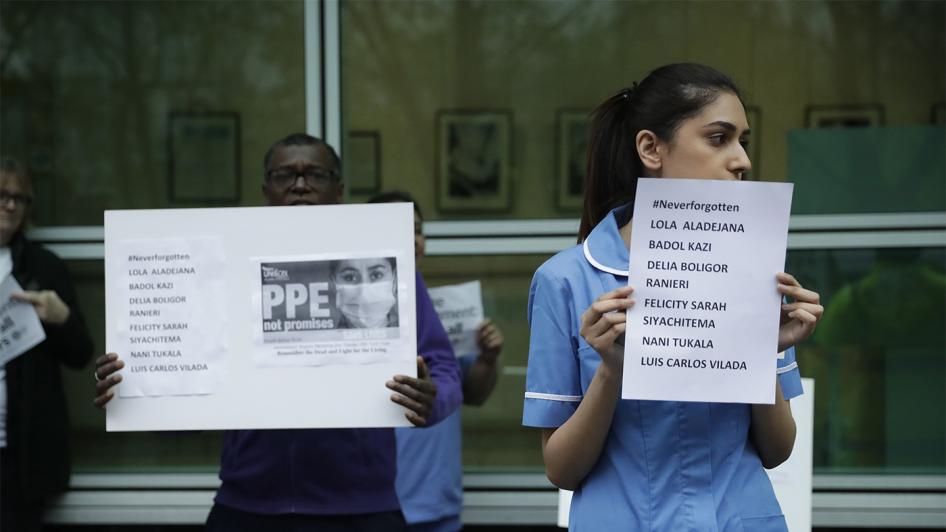(London) – The United Kingdom government’s response to major challenges in 2020, often set aside human rights and sought to bypass the institutions that protect them, Human Rights Watch said today in its World Report 2021. An inconsistent approach to promoting human rights in foreign policy undermined the country’s positive foreign policy initiatives.
“The UK government needs to stop seeing human rights and democratic institutions as an impediment to getting things done,” said Benjamin Ward, deputy Europe and Central Asia director at Human Rights Watch. “Respecting people’s rights and letting parliament and the courts do their work, makes for stronger and more effective responses to the challenges the UK faces.”
In the 761-page World Report 2021, its 31st edition, Human Rights Watch reviews human rights practices in more than 100 countries. In his introductory essay, Executive Director Kenneth Roth argues that the incoming United States administration should embed respect for human rights in its domestic and foreign policy, in a way that is more likely to survive future US administrations that might be less committed to human rights. Roth emphasizes that even as the Trump administration mostly abandoned the protection of human rights, other governments stepped forward to champion rights. The Biden administration should seek to join, not supplant, this new collective effort.
The UK left the European Union in January 2020 with an 11-month transition period to reach an agreement on future relations. A last-minute deal agreed by the UK and the EU in late December averted the predicted short-term impact on food and medicine imports. There are continued concerns that a future UK government could seek to weaken, in domestic law, workers’ and other rights previously protected by EU law.
Moves by the UK government in 2020 adversely affected the rule of law and democratic institutions that serve as a check on its power. The government used rush tactics to pass pandemic-related emergency legislation without proper scrutiny. It sought to restrict media access to news conferences in the prime minister’s office. The government began a review of court powers, motivated by a desire to curb them, and a similar review of the framework and operation of the Human Rights Act.
The Covid-19 pandemic had killed 73,512 people in the UK by the end of 2020, among the highest number of deaths in Europe, with particular concern about disproportionate mortality rates among older people and people of Black and minority ethnic backgrounds.
The economic downturn following the pandemic led to an unprecedented surge in applications for unemployment support through the country’s social security systems, and doubling of demand at food banks. Pandemic school closures left children from low-income families, who rely on schools for their main meal of the day, going hungry.
Concerns remained about whether the government would extend temporary measures to mitigate the pandemic’s impact, including providing housing for homeless people, an evictions moratorium, support for domestic violence victims, and a modest increase to social security payments.
Violence against women increased during the pandemic lockdown without adequate government support for service providers, especially those operated by and for migrant, Black, and other minority ethnic women.
There was inadequate progress in addressing injustice towards British citizens, primarily of Caribbean origin, from the “Windrush” generation, who have been treated as foreigners and denied their rights.
The government introduced legislation in parliament that would effectively create immunity after five years for abuses committed abroad by UK soldiers, including torture and war crimes. In December, the Office of the Prosecutor of the International Criminal Court closed its preliminary examination into alleged war crimes by UK nationals in Iraq between 2003 and 2008, despite finding that UK forces were responsible for numerous war crimes in Iraq, including willful killing or murder, torture and other serious abuses of detainees, and rape and other sexual violence.
The UK took some positive steps to strengthen international human rights protection, including by creating its own human rights sanctions mechanism, and showed international leadership, including on Belarus and Hong Kong, and at the UN Human Rights Council. Yet its overall approach lacked consistency, with the government announcing it would seek to resume arms sales to Saudi Arabia, for example, the day after imposing human rights sanctions on some Saudi officials.
UK: Setting Aside Rights when Inconvenient
Responding to Pandemic, Brexit, Government Undermines Institutions that Protect Rights
Your tax deductible gift can help stop human rights violations and save lives around the world.
Region / Country
Most Viewed
-
April 23, 2024
UK’s Harmful Rwanda Bill to Become Law

-
November 25, 2019
A Dirty Investment

-
June 24, 2022
Q&A: Access to Abortion is a Human Right

-
April 27, 2021
A Threshold Crossed

-
June 21, 2017
“Just Let Us Be”





